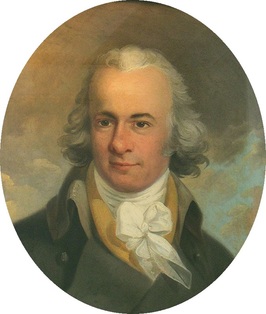Newton and the fight to abolish slavery
 William Wilberforce
William Wilberforce
Despite his continued involvement in slavery when he first became a Christian, Newton later rejected the slave trade. He described this "unhappy and disgraceful" trade as contradictory to the "feelings of humanity" and as the "stain of our national character”.
Newton befriended and mentored the young politician William Wilberforce, encouraging and supporting his fight against slavery in the British Empire. In 1788, he wrote a booklet called “Thoughts upon the African Slave Trade” which supported the campaign. This was re-printed and distributed to every one of the Members of Parliament to help the abolitionist cause.
When the bill to abolish the slave trade was defeated in 1796, William Wilberforce was devastated. He fell seriously ill and considered retiring from public life.
Seeking counsel, he wrote to his mentor. Newton wrote back urging Wilberforce to stand strong, "One may not be able to calculate all of the advantages that may result from your service in public life. Though you have not, as yet, fully succeeded in your persevering endeavours to abolish the slave trade, since you took it in hand the condition of the slaves has undoubtedly been improved. [God] is always near. He knows our wants, our dangers, our feelings, and our fears. By looking to him we are made strong out of weakness.”
Newton's letter gave Wilberforce the strength he needed. He remained in politics and continued the fight. Eleven years later, the Trans Atlantic Slave Trade was legally abolished in the spring of 1807.
It took 20 years but finally the first legislation against the Trans-Atlantic Slave Trade was passed in 1807. Shortly before he died that same year, the old man declared, “My memory is nearly gone; but I remember two things: that I am a great sinner, and that Christ is a great Saviour”.
Newton befriended and mentored the young politician William Wilberforce, encouraging and supporting his fight against slavery in the British Empire. In 1788, he wrote a booklet called “Thoughts upon the African Slave Trade” which supported the campaign. This was re-printed and distributed to every one of the Members of Parliament to help the abolitionist cause.
When the bill to abolish the slave trade was defeated in 1796, William Wilberforce was devastated. He fell seriously ill and considered retiring from public life.
Seeking counsel, he wrote to his mentor. Newton wrote back urging Wilberforce to stand strong, "One may not be able to calculate all of the advantages that may result from your service in public life. Though you have not, as yet, fully succeeded in your persevering endeavours to abolish the slave trade, since you took it in hand the condition of the slaves has undoubtedly been improved. [God] is always near. He knows our wants, our dangers, our feelings, and our fears. By looking to him we are made strong out of weakness.”
Newton's letter gave Wilberforce the strength he needed. He remained in politics and continued the fight. Eleven years later, the Trans Atlantic Slave Trade was legally abolished in the spring of 1807.
It took 20 years but finally the first legislation against the Trans-Atlantic Slave Trade was passed in 1807. Shortly before he died that same year, the old man declared, “My memory is nearly gone; but I remember two things: that I am a great sinner, and that Christ is a great Saviour”.
Proudly powered by Weebly